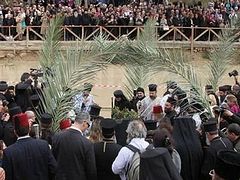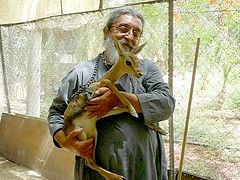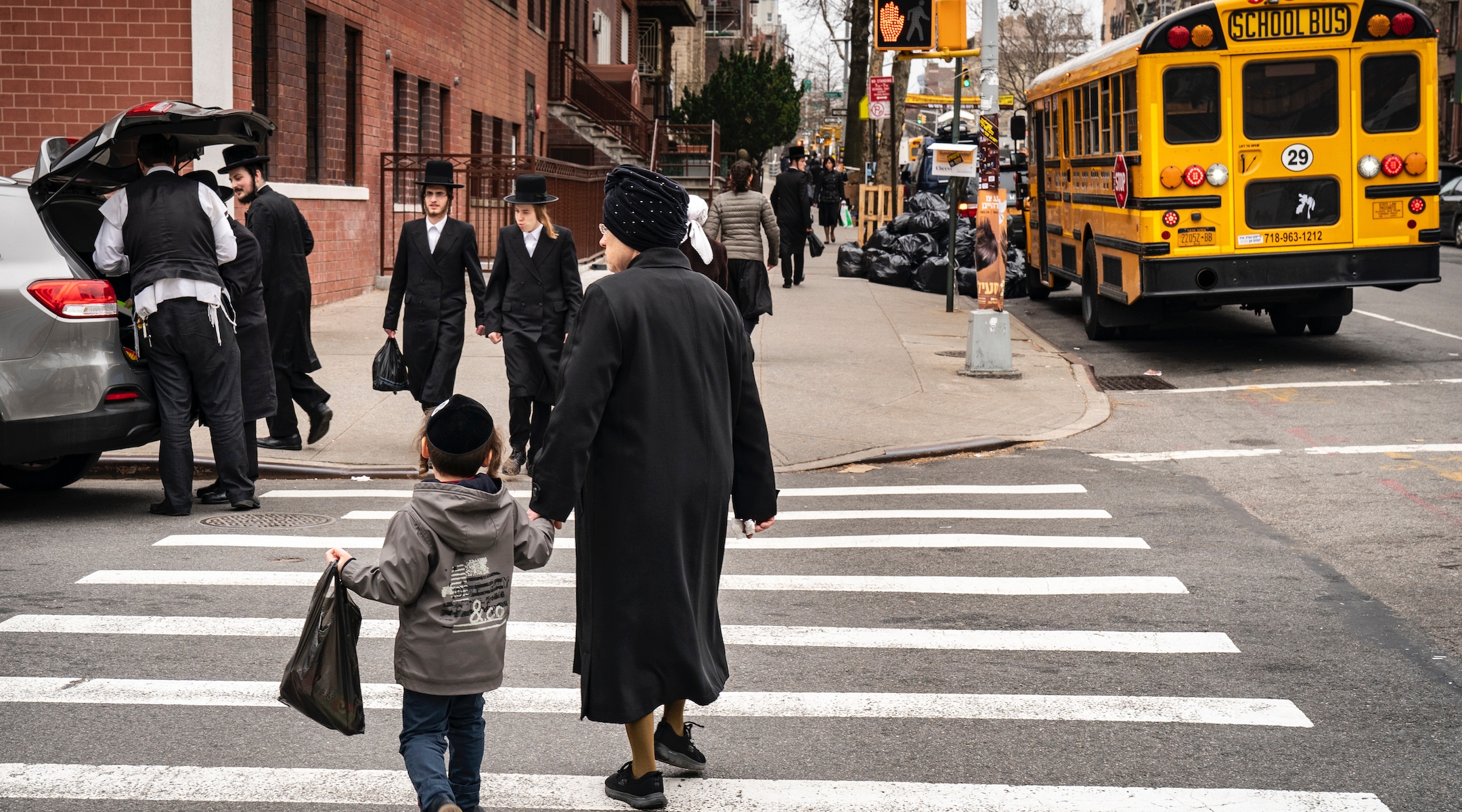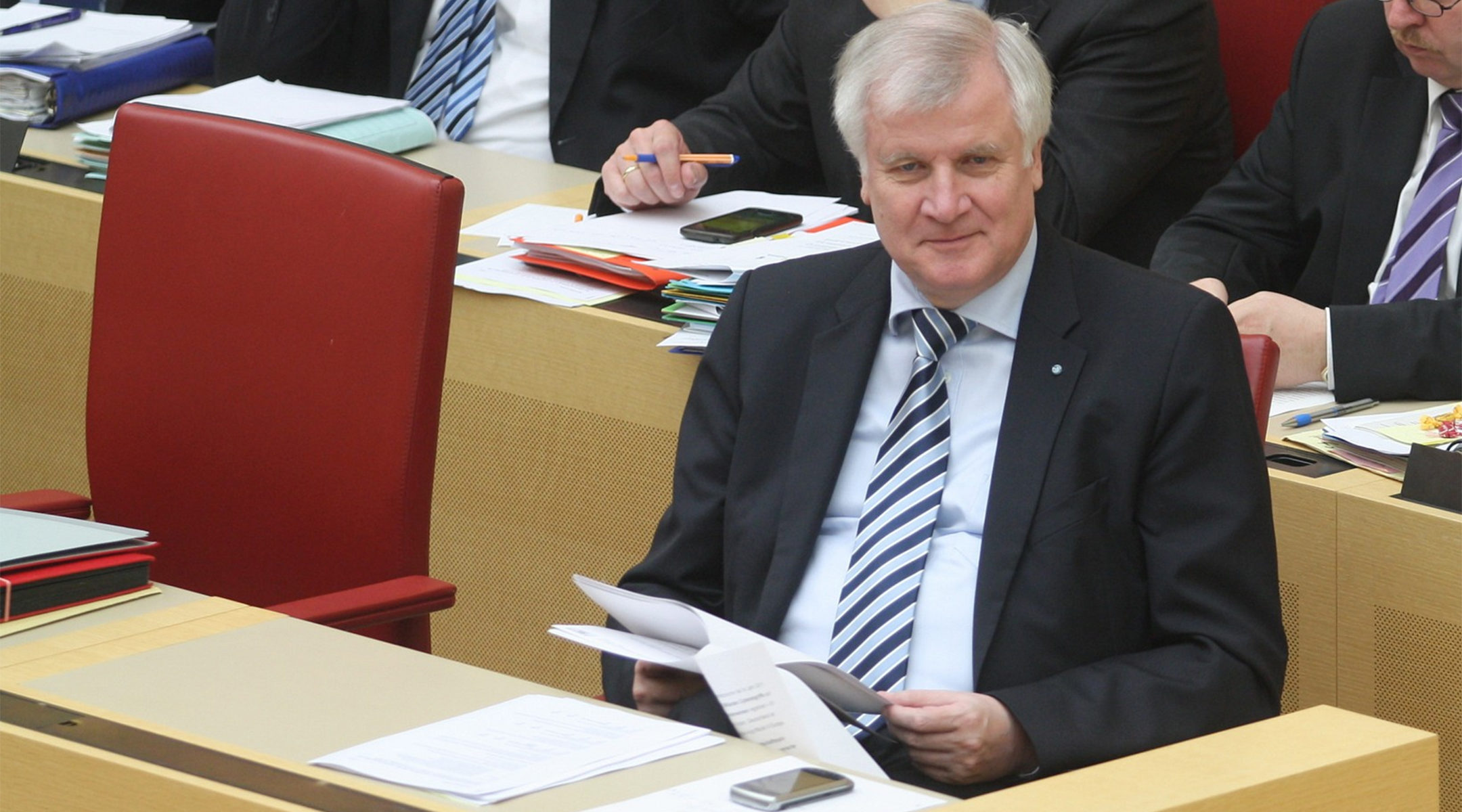THE SACRED SITES OF JERICHO
Towards the Jordan
The ancient Biblical region with its history, place-names, architecture, art, and traditions attracts the attention of many people. Believers have a special attitude towards it: Here the Bible comes back to life and the desert wind blows away millennial boundaries. Though my trip was planned in advance, it took place not immediately but coincided with my birthday, as a gift from above. The itinerary was formed of opportunities and wishes, and one of the main wishes was to immerse myself in the waters of the Jordan River. The bathing place is located seven kilometers (c. 4.35 miles) from the town of Jericho. And, as it turned out, the town itself is quite interesting and likes Russian speech.
“The City of Palms”
The town of Jericho lies thirty kilometers (c. 18.64 miles) from Jerusalem. It is mentioned in the Bible as the “City of Palm Trees” and it still lives up to its name today. The settlement lies in the Judean Desert 260 meters (c. 853 feet) below sea level, so it is much warmer here, and your lips become dry from sun exposure. According to the archeologists, Jericho is 10,000 years old.
The trumpets of Jericho
The first thing associated with this area is “the trumpets of Jericho”—the Biblical narrative of the city’s capture by the Jews who arrived to the Promised Land. For six days the Israelite army six times walked around Jericho with their priests blowing trumpets, and at the seventh time on the seventh day the city walls fell (see Josh. 6:1-20). The ruins of old Jericho lie to the west of the modern town center—both ruins of the walls and remains of the palaces of the Hasmonean Dynasty and Herod the Great.
The Mount of Temptation
The Mount of Temptation (also Quarantania, “Of the Forty Days”) towers on the northwestern outskirts of Jericho. There is a Greek Orthodox monastery on its slope, whose main relic is the stone on which Jesus Christ prayed during His forty-day fast, preparing for His ministry on Earth, and where He was tempted by satan.
And the devil said unto Him, If Thou be the Son of God, command this stone that it be made bread. And Jesus answered him, saying, It is written, That man shall not live by bread alone, but by every word of God. And the devil, taking Him up into an high mountain, shewed unto Him all the kingdoms of the world in a moment of time. And the devil said unto Him, All this power will I give Thee, and the glory of them: for that is delivered unto me; and to whomsoever I will I give it. If Thou therefore wilt worship me, all shall be Thine. And Jesus answered and said unto him, Get thee behind me, Satan: for it is written, Thou shalt worship the Lord thy God, and Him only shalt thou serve. And he brought Him to Jerusalem, and set Him on a pinnacle of the temple, and said unto Him, If Thou be the Son of God, cast Thyself down from hence: For it is written, He shall give His angels charge over thee, to keep thee: And in their hands they shall bear thee up, lest at any time thou dash thy foot against a stone. And Jesus answering said unto him, It is said, Thou shalt not tempt the Lord thy God. And when the devil had ended all the temptation, he departed from Him for a season (Lk. 4:3-13).
The mountain is 380 meters (c. 1246.7 feet) high. There are numerous small caves on its different levels and this is testimony to the fact that hermits lived here from the first centuries of Christianity. It will take you twenty to thirty minutes to climb the mountain along the serpentine path. If you want to reduce the distance you can use an elevator. At the monastery you can submit intercession lists for health of the living and repose of the departed, all names should be written in capital letters.
The Dependency of St. John the Baptist
In 1867 the Chief of the Russian Orthodox Ecclesiastical Mission in Jerusalem Archimandrite Antonin (Kapustin), “the gatherer of Russian Palestine,” whose 200th birthday we are celebrating this year, obtained a plot in Jericho for receiving Christians who made pilgrimages to the Mount of Temptation and the site of the Baptism of Christ on the Jordan River. This is how he describes this spot in his diary: “By three in the afternoon we reached our pilgrimage center in Jericho… It is bright, clean, and cozy here, and the house is spacious… There is a big garden attached to the house with olive trees, lemons, orange trees, pomegranates, even bananas, to say nothing of the huge fig trees and branchy willows. But the most amusing are grape vines of an incredible size.”
The House of Zacchaeus the Publican
The bought site is above all notable for the fact that it was here that the house of the repentant tax-collector Zacchaeus stood. This is what the Gospel tells us about him: And Jesus entered and passed through Jericho. And, behold, there was a man named Zacchaeus, which was the chief among the publicans, and he was rich. And he sought to see Jesus who He was; and could not for the press, because he was little of stature. And he ran before, and climbed up into a sycamore tree to see Him: for He was to pass that way. And when Jesus came to the place, He looked up, and saw him, and said unto him, Zacchaeus, make haste, and come down; for to day I must abide at thy house. And he made haste, and came down, and received Him joyfully. And when they saw it, they all murmured, saying, That He was gone to be guest with a man that is a sinner. And Zacchaeus stood, and said unto the Lord: Behold, Lord, the half of my goods I give to the poor; and if I have taken any thing from any man by false accusation, I restore him fourfold. And Jesus said unto him, This day is salvation come to this house, forsomuch as he also is a son of Abraham. For the Son of man is come to seek and to save that which was lost (Lk. 19:1-10).
The tomb of Venerable Cyriacus the Hermit
As a result of excavations carried out on this site columns of a sixth-century Byzantine church along with the mosaic headstone of Venerable Cyriacus were discovered. A chapel in honor of St. John, the Holy Prophet, Forerunner and Baptizer of the Lord, was erected in order to preserve the tomb.
“The altar of our church stands on the grave of Venerable Cyriacus the Hermit—the greatest fifth-century saint,” Sister Anna (Garmider), the dependency’s senior nun, relates. “For 1,500 years the Lord has kept the mosaic above his head along with the Greek epitaph, reading that here rests the grave of the Venerable Presbyter Cyriacus, ‘who built this church’. And we discovered another mosaic when we planted trees. This place was marked on old maps as the Lavra of Cyriacus the Hermit.”
The plot of Zacchaeus was returned to the Russian state by the Palestinian President Yasser Arafat in 2000. Then there were stables in the pilgrims’ hostel, which in the nineteenth century had even accommodated visitors from the Imperial House, and dirty streams from the first floor (that had been added to the chapel) flowed down through a hole right to the tomb. Metropolitan Theeodosius of Tambov and Rasskazovo, who then headed the Russian Ecclesiastical Mission in Jerusalem, with the help of his assistants cleared up and put things in order at the plot. Services were resumed at the chapel and the hotel’s restoration was begun.
“Recently a new gate was installed, and a pavement along the hotel’s façade and a fence around the building were made. We could only dream of this before,” Nun Anna continues. “Earlier, merchants used to hang their goods right on our walls and windows; we had to turn on the light in the day time. We couldn’t open a window because someone from outside might stretch out his hand and say hello to us. And now even our façade is illuminated at night, so today the hotel resembles old Moscow.”
Among the forthcoming works are the restoration of the chapel’s frescoes and a number of separate buildings of the dependency. “There are vaulted ceilings there, small rounded windows, iron ornaments on wood—these are very beautiful and their spirit of antiquity gives you comfort,” Sister Anna recounts.
“The fresco of Venerable Cyriacus inside the chapel, to the left above the table of oblation, along with the whole west wall of the church are very vulnerable to mold growth. We cannot restore them because then whole layers start crumbling away. Damp-proofing is needed first of all,” the nun explains. The budgeted cost of the work scheduled is $80,000. “We should preserve this plot and beautify it for pilgrims among whom there may be another Zacchaeus, who first was a chief tax collector but later became Bishop of Caesaria in Palestine, an apostle, and eventually was martyred for Christ,” Nun Anna added.
The Russian Museum and Park Complex
By a decree of the President of the Russian Federation Dmitry Medvedev a museum and park complex was built on the central street of Jericho, which is adjoined by another Russian plot—Joasaph plot—which was obtained by the Imperial Orthodox Palestine Society in 1883 and returned in 1994. On the territory of the park, among the plants mentioned in the Bible the giant Zacchaeus’ fig tree (ficus-sycomorus) still bears fruit. The finds of the joint Russian-Palestinian archeological expedition dating from the first century B.C. to the eighteenth century A.D. are displayed at the museum. Among them are Jewish, Byzantine, Roman, Muslim coins, dishes, household items, church vessels, and sixth-century Byzantine mosaics. On the basis of the discovered artefacts the archeologists have suggested that a monastery may have existed on the site of Joasaph plot. The locals have grown fond of the park: newlyweds come here to have their photos taken, and the street was named after a Russian politician.
The Monastery of the Holy Archangel Michael
The distance from Jericho to the Jordan River is seven kilometers (c. 4.35 miles). On the way you’ll find the Greek Orthodox Monastery of the Holy Archangel Michael, where St. Zosimas of Palestine lived in the sixth century. According to a tradition of the Middle East monasteries, monks used to retreat for the period of the Lenten fast to the desert or caves for more intensive ascetic labors and return (not all would come back—some could die) a week before Easter, on Palm Sunday. Following this rule, Monk Zosimas once retired to the wilderness where he met St. Mary of Egypt, a former harlot who through the power of her repentance achieved sanctity and told elder Zosimas her own story.
The Monastery of St. Gerasimus of the Jordan
There is also the Monastery of St. Gerasimus of the Jordan in the Jordan Valley. It was founded in the fifth century around the cave where the Holy Family stopped on their way to Egypt. An ancient fresco depicting Jesus Christ, the Mother of God, and St. Joseph the Betrothed has survived in the lower church-cave. St. Cyriacus the Hermit, mentioned above, was among the disciples of St. Gerasimus. About the year 575, these places were visited by the Byzantine monks John Moschus and Sophronius (afterwards a patriarch) of Jerusalem—they jotted down on papyrus numerous accounts of monks, hermits, anchorites, and laypeople and then compiled a book based on these stories, The Spiritual Meadow.
The monastery acquired its present appearance after the reconstruction of 1882-1885, undertaken on the initiative of Archimandrite Antonin (Kapustin). The upper church is adorned by the iconostasis which was gifted by the Russian Ecclesiastical Mission in 1884. The columns and walls are adorned with frescoes depicting monks and hermits who lived in The Judean Desert or the founders of monasticism: Saints Anthony the Great, Euphemius the Great, Hilarion the Great, Chariton the Confessor, Zosimas of Palestine, Mary of Egypt, George the Chozebite, and others.
The Jordan River
The water of the Jordan River is earth-colored, and reeds grow along its banks. For Christians, immersion in its waters is like the second baptism—the cleansing of sins by those who come here with repentance that was preached on these banks by St. John the Baptist 2,000 years ago. Then went out to him Jerusalem, and all Judaea, and all the region round about Jordan, And were baptized of him in Jordan, confessing their sins (Mt. 3:5-6). And it was here that the Lord Jesus Christ was baptized. And Jesus, when He was baptized, went up straightway out of the water: and, lo, the heavens were opened unto Him, and He saw the Spirit of God descending like a dove, and lighting upon Him: and lo a voice from heaven, saying, This is My beloved Son, in Whom I am well pleased (Mt. 3:16-17). In the nineteenth century, many Russian pilgrims wished to be buried in the shirts in which they immersed themselves in the Jordan River.
“People come to the desert seeking tranquility. Come to Jericho!”
The everyday hustle and bustle of modern Jericho is interrupted only by the loud calls of a mullah. “But he also reminds Christians of prayer,” Nun Anna believes. She once again invites everybody to come to the Dependency of St. John the Baptist to have a rest, to work a little, to walk mountain trails, and to immerse themselves in the waters of the Jordan. “People come to the desert seeking tranquility,” she recalls the words of one Florentine pilgrim and repeats, “Come to Jericho!”
The author of the article expresses thanks to the press service of the Russian Ecclesiastical Mission in Jerusalem for her invitation to the Holy Land.
1/23/2017













